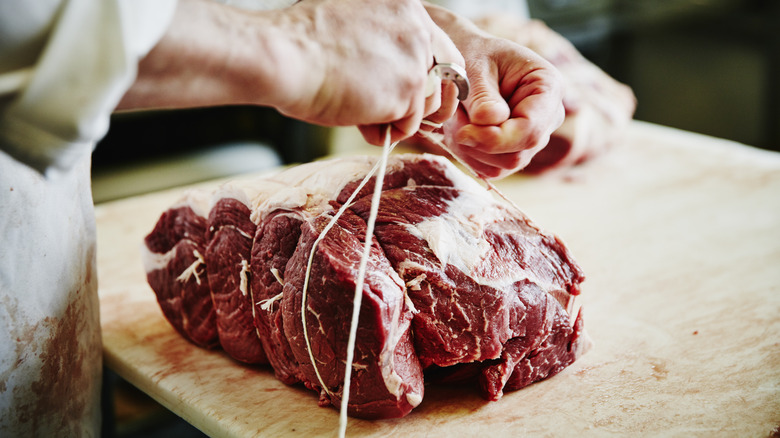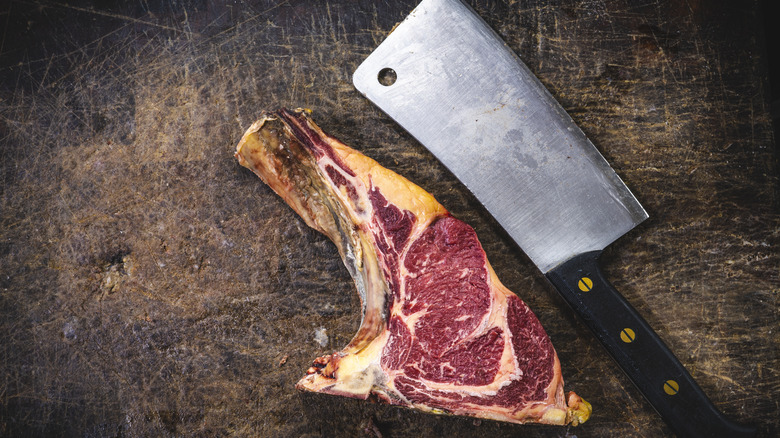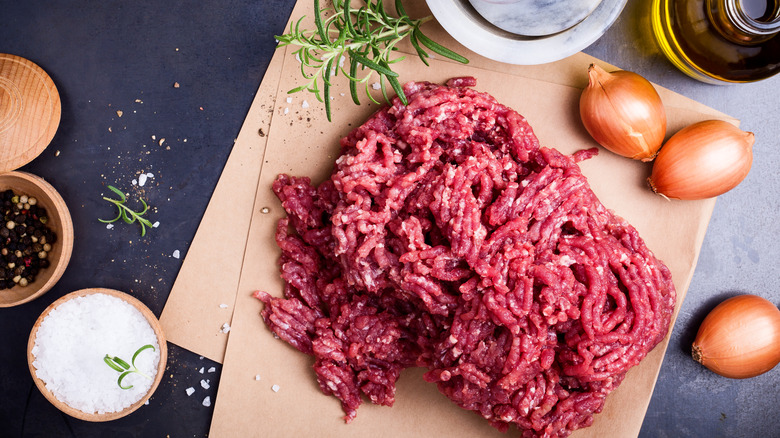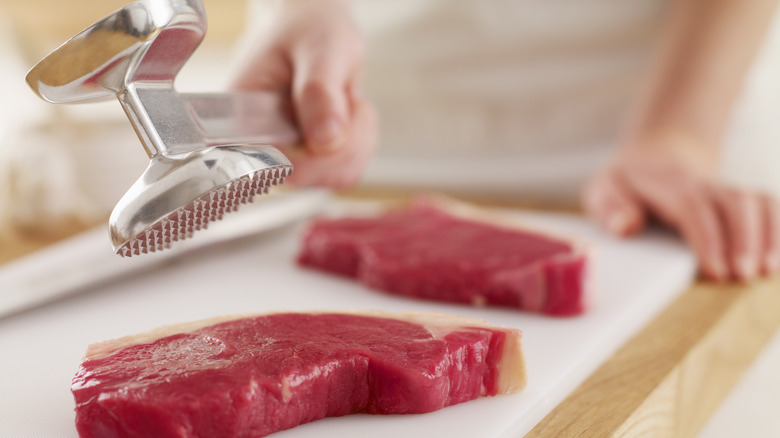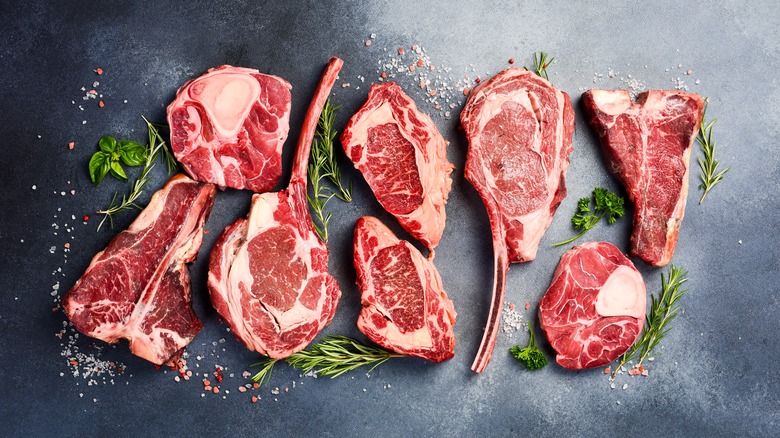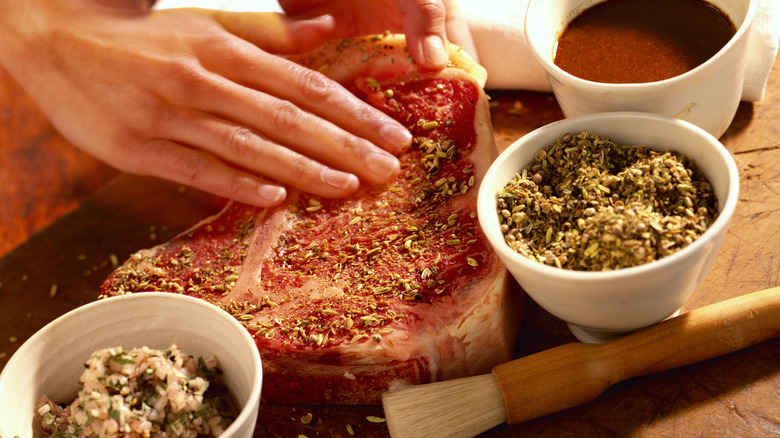5 Things You Should Be Asking Your Butcher To Do With Your Beef
We may receive a commission on purchases made from links.
Albeit less prevalent than in days past, a standalone butcher shop — and even the butcher section of your local supermarket — is a most useful place both to source fresh cuts of your favorite meat and also to get help with preparing it. If beef is on the menu, it's important to know there are a handful of time-saving requests you can make from your butcher that will streamline your cooking. These are applicable to many of the most popular cuts of beef and are all in a day's work for the experts behind the counter.
Beyond the questions you should always ask a butcher, you can absolutely request assistance with whatever cuts of beef you're buying. Whether it's trimming down an extra fatty roast, grinding the meat so you can make burgers, or even helping with custom dry-aged steaks, the butcher is an excellent resource. Note that, while many grocery store butchers can do most of the following, in some cases, you might need to seek out a specialty butcher for certain requests. That said, you don't have to feel shy about approaching the meat counter to gain insight along with a helping hand from those who know beef best.
Trim the fat off large cuts of meat like briskets or roasts
For a rump roast crock-pot recipe and other beef roasts, it's important to get the right cut of meat that will cook down to create the most flavor. While you want something with adequate fat content, it's still necessary to trim an overly fatty cut of beef like a brisket for the right balance of texture and flavor. You can easily ask your butcher to trim the fat from your beef or even to cut it up for you if you want to make an old-fashioned beef stew recipe. This will save you the time and effort of having to do so at home, and it allows you to avoid disposing of the food waste yourself.
A good butcher knows the cuts of meat and how to properly trim and cut everything for the best flavor and uniformity. Butchers also have kitchen tools on-hand that you might not have in your own kitchen, which make quick work of the tasks. This makes for a "no muss, no fuss" kitchen setup once you've brought your beef home, so you can get to cooking much quicker.
Grind your beef for burgers and meatballs
It may seem intimidating to approach the butcher counter and ask if someone there can grind your meat, however, this allows you to select your favorite cuts of beef to make any number of the best ground beef recipes. From burger patties to meatballs to meatloaf, it makes a world of difference to have a say about your preferred beef for grinding. Knowing the ideal beef ratio when it comes to cooking stovetop burgers, you can make an informed decision about the quality and fat content of the beef you want.
There are many schools of thought regarding the best meat-to-fat ratio for homemade meatballs as well as burgers, and asking your butcher to grind the meat of your choosing ensures you're getting exactly what you prefer. Whereas recipes might call for a leaner or fatter ground beef, only you can determine what works best for your home cooking.
Try a little tenderizing for tough cuts like skirt and flank steaks
If you're buying a cut of beef that you know will need to be tenderized later, skip the extra work in your home kitchen, and ask for assistance from your butcher instead. If you don't already have a kitchen gadget for the job, like an OXO Good Grips Easy-Clean Bladed Meat Tenderizer, there's nothing quite like a butcher's expert touch to tame even the toughest cuts of beef. For example, if you're preparing homemade Philly cheesesteaks, you can ask your butcher to tenderize the flank steak for you and even to slice it into thin strips before you bring it home to cook.
For a grilled skirt steak with chimichurri recipe, it's key to start with a bit of beef that's already been tenderized. This will also allow the steak to better absorb all the delicious flavors in the chimichurri sauce. When it comes to preparing typically tough cuts of beef, asking your butcher to tenderize it first is like having a superhero meat preparer helping you out.
Custom dry-aged steaks
Custom dry-aged steak is a bit of a tall order for a standard supermarket, so it's always best to get dry-aged beef from a butcher. Visit your local specialty shop to get a thoughtfully prepared steak that's both delicious and safe to consume. The dry-aging process is lengthy and necessitates closely monitored temperature control to avoid contamination. Note that, due to the rather intense process, this will be a higher priced item than a standard steak.
Be sure to ask questions of your butcher to better understand the dry-aging process and get a feel for what you would like best. A 30-day dry-aged beef is among the average age for this style of meat. The longer the aging time, the more pungent the flavor and more expensive the price tag. Definitely start out slow, and take into consideration the entire scope of how this meat is expertly crafted before making its way to your dinner table.
Season your meat to add robust flavor
It's always great to make your own spice blends at home for total flavor control, but if you don't have the time or inclination, you can definitely ask your local butcher to help season your beef. Butchers will often have a variety of seasonings, spices, and rubs that will save you even more time in the kitchen. Whether you need to spice up ground beef for a meat sauce, prepare picture-perfect seasoned steaks for your next meal, or you just want to get a little experimental with flavors but aren't sure where to start, simply ask your butcher for an expert recommendation and a helping hand.
The mark of masterfully prepared meat is its flavor, and the best way to start trying out new flavors is with well-informed choices. A butcher worth their salt (and pepper!) should be more than happy to share their knowledge with you and, time permitting, possibly even demonstrate or explain their seasoning process so you can try it yourself next time. Although you might feel nervous about making requests of your butcher, it can only help you learn and, after all, knowledge is power!
